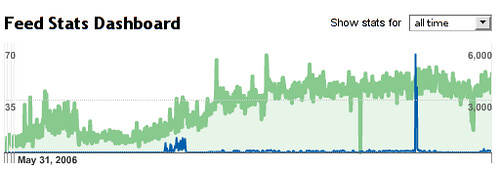Blog readership statistics.
I am not sure if this is good or bad:

On one hand, I have more subscribers than ever, even considering when this blog was in planetkde (BTW: maybe I should add my pyqt feed there again? Nah, I don't qualify as "active KDE contributor")
The dip in the last three monts was because I just posted nothing, and now I am posting again, it's doing well.
On the other hand, I am at 50-some subscribers, which is a bit pathetic for a blog that has existed for over 9 years ;-)
On the gripping hand (Larry Niven FTW!) I am having more fun with the blog than I had in quite a while, so I would post even if noone read it.
And in case you are wondering what that peak of over 6000 reach (the average is under 100!) it's this. That post had over 12000 visitors. My second most popular story had only 3800.

Here's the most popular content in the last 2 years or so, selected from 783 posts (784 with this one) and 47 longer stories:
-
12228 visitors: Windows: My eXPerience
So I wanted to see what windows looked like. Don't worry, I feel better now.
-
3797 visitors: Making Linux systems that don't suck. Part II
A rant on cron and at. I never imagined this would be number 2.
-
2968 visitors: BOP: Ball Oriented programming
I am rather proud of this one: a pyqt-based graphical, animated interpreter for FLIP, a language based on balls :-)
-
2888 visitors: Good News: Linux gives life to old hardware. Bad News: Maybe in some cases it shouldn't.
Silly, yes, but a cool picture :-)
-
1870 visitors: PyCells: The Python SpreadSheet redux
My second or third attempt at writing a toy spreadsheet using python. I have been at it for about 5 years, apparently.
This is popular... even when the code it describes is based on a completely broken library!
-
1841 visitors: Squid authentication via POP or IMAP
This was already about 4 years old when I started counting, so I have no idea how many visitors it really had. It is a handy script, I still use it sometimes!
-
1813 visitors: The Linux Booting Process Unveiled
I really expected this one to be much higher. It's even linked from wikipedia! Every day it has 2 or 3 hits. Then again, the first 3 years are not being counted ;-)
-
1706 visitors: Queue Management for Qmail
While the tool it introduces is lame nowadays, the ideas are sound, and it explains a real problem.
-
1548 visitors: Custom widgets using PyQt
Very obsolete, noone should read that.
-
1505 visitors: How to make your own distro in 3 not-so simple steps
Oh, this one. It is wrong. It gives bad advice. Yet noone seems to notice ;-) Not my best idea, not my best effort, still get email about it every month or so.
